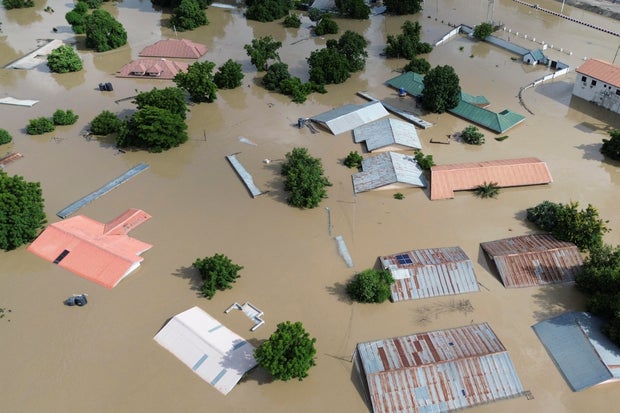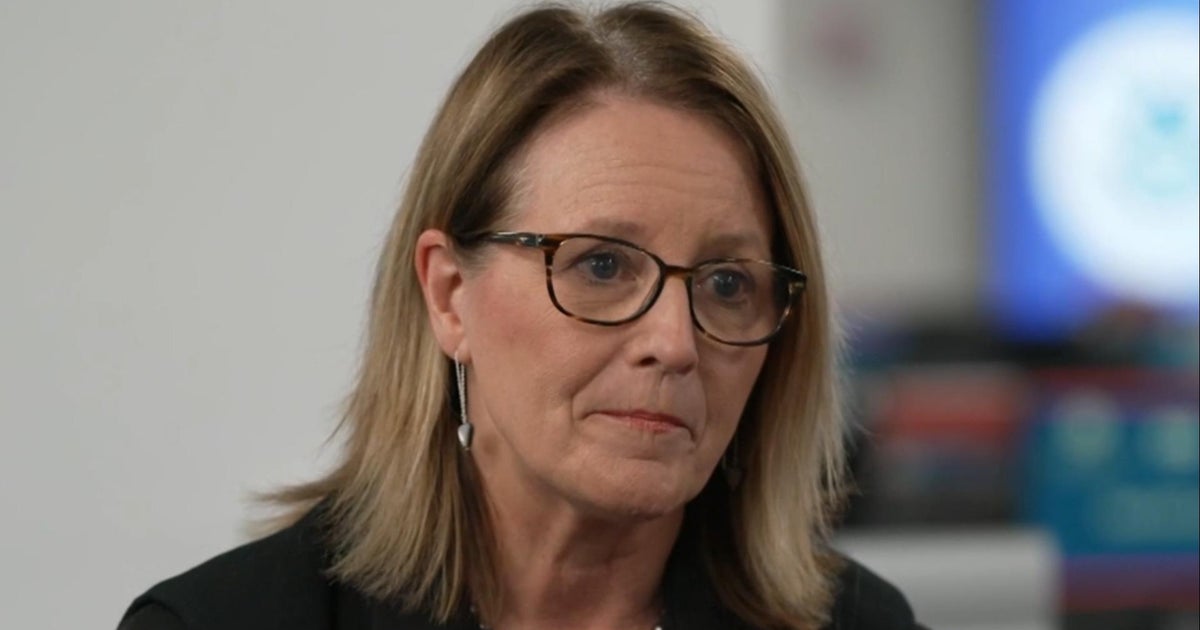CBS News
Deadly flooding in West and Central Africa leaves corpses of crocodiles and snakes floating among human bodies

Houses swept away to the very last brick. Inmates frantically fleeing the city’s main prison as its walls were washed away by water rising from an overflowing dam. Corpses of crocodiles and snakes floating among human bodies on what used to be main streets.
As torrential rains across Central and West Africa have unleashed the most catastrophic floods in decades, residents of Maiduguri, the capital of the fragile Nigerian state of Borno — which has been at the center of an Islamic extremists’ insurgency — said they have seen it all.
Earlier this week, Nigerian authorities said more than 270 inmates were missing after escaping from custody when severe flooding damaged a prison in Maiduguri, CBS News partner BBC reported. Borno state Governor Babagana Zulum described the extent of the damage in the area as “beyond human imagination.”
The floods, which have killed more than 1,000 people and displaced hundreds of thousands across the region this year, have worsened existing humanitarian crises in the countries which have been impacted the most: Chad, Nigeria, Mali and Niger. Over four million people have been affected by flooding so far this year in West Africa, a threefold increase from last year, according to the U.N.
With rescue operations still underway, it is impossible to give an accurate count of lives lost in the water. So far, at least 230 were reported dead in Nigeria, 265 in Niger, 487 in Chad and 55 in Mali, which has seen the most catastrophic flooding since the 1960s.
While Africa is responsible for a small fraction of global greenhouse gas emissions, it is among the regions most vulnerable to extreme weather events, the World Meteorological Organization said earlier this month. In sub-Saharan Africa, the cost of adapting to extreme weather events is estimated between $30-50 billion annually over the next decade, the report said. It warned that up to 118 million Africans could be impacted by extreme weather by 2030.
Maiduguri, the capital of Borno state, has been under significant strain. Over the last decade, Borno has been hit by a constant string of attacks from Boko Haram militants, who want to install an Islamic state in Nigeria and have killed more than 35,000 people in the last decade.
AUDU MARTE/AFP via Getty Images
Saleh Bukar, a 28-year-old from Maiduguri, said he was woken up last week around midnight by his neighbors.
“Water is flooding everywhere!” he recalled their frantic screams in a phone interview. “They were shouting: ‘Everybody come out, everybody come out!” Older people and people with disabilities did not know what was going on, he said, and some were left behind. Those who did not wake up on time drowned right away.
Local authorities are overwhelmed by the scale of the disaster: over 600,000 people in Borno state have been displaced, while at least 100 were killed and 58 injured, according to the U.N.
Last week, floods killed about 80% of the animals at the Borno State Museum Park and an unspecified number of reptiles escaped. Ali Donbest, who runs the Sanda Kyarimi Zoo, told the BBC that he does not know exactly how many wild animals escaped the zoo but a hunt was on to locate them. He also said the cages where the lions and hyenas were kept had been submerged by floodwaters but the zoo could not determine if they had escaped.
Maiduguri resident Ishaq Sani told the BBC his biggest fear is to come across a wild animal. He abandoned his home due to the floods and is now staying with a friend in another location.
The waters also knocked down the walls of the local police station and some of the government’s offices.
Rescue operations continue 10 days later, with some parts of the city returning to normal as waters recede.
Flooding forces woman to abandon her baby
Survivors recounted chilling scenes of bodies in the floodwaters.
Aishatu Ba’agana, a mother of three, had to abandon her recently born baby as water surging over her house overwhelmed her. “I yelled for my family to help me get my child, but I don’t know if they were able to. I haven’t seen any of them since,” she said, crying at the camp where rescue workers brought her.
The flood also destroyed crucial infrastructure, including two major dikes of a dam along Lake Alau. When the dam failed, 540 billion liters of water flooded the city. Key bridges connecting Maiduguri collapsed, turning the city into a temporary river.
Governor Babagana Zulum urgently appealed for international assistance. “Our resources are stretched to the limit, and we cannot do this alone,” he said.
The World Food Program has set up kitchens providing food to the displaced in Maiduguri as well as emergency food and cash assistance to people in the most hard-hit areas. USAID said Wednesday it has provided more than $3 million in humanitarian assistance to West and Central Africa, including $1 million provided in the immediate aftermath of the floods.
But many say they were left to fend for themselves.
Floods in mostly arid Niger have impacted over 841,000 people, killing hundreds and displacing more than 400,000.
Harira Adamou, a 50-year-old single mother of six, is one of them. She said the floods destroyed her mud hut in the northern city of Agadez.
“The rooms are destroyed; the walls fell down,” she said. “It’s a big risk to live in a mud hut but we don’t have the means to build concrete ones.”
Adamou, who is unemployed and lost her husband four years ago, said she has not received any support from the state and has not had the opportunity — or the means — to relocate. She and her children are living in a temporary shelter next to their shattered hut, and fret that the torrential rains might return.
“I understood there was a change in the weather,” she said. “I have never seen a big rain like this year here in Agadez.”
In Maiduguri, 15% of the city remains underwater, according to local authorities. As forecasts predicted more rains across the region, Nigerian authorities warned earlier this week that more floods are expected.
Bukar said he kept going back to see whether the water that swallowed his home had receded, but that has not happened. He said he has not received any aid from authorities except for some food items handed out at the local school, where he is sheltering with 5,000 others.
He is trying to stay sane by helping others. Along with his friend, he helped recover 10 bodies and rescued 25 people, rowing down the streets in a canoe. He said he’s also helping out cooking meals for those that are sheltering with him.
“I am volunteering to help, but I am also a victim,” he said. “Our people need us. They need help.”
The deadly flooding comes about five months after hundreds of people in Tanzania and Kenya died after heavy rain during the region’s monsoon season.
CBS News
California declares emergency after severe U.S. case of H5N1 bird flu

Watch CBS News
Be the first to know
Get browser notifications for breaking news, live events, and exclusive reporting.
CBS News
French man sentenced for drugging ex-wife and facilitating her rape by dozens of men

Watch CBS News
Be the first to know
Get browser notifications for breaking news, live events, and exclusive reporting.
CBS News
Discovery of “tipped over” black hole surprises NASA scientists

NASA researchers combined years of data and new imaging techniques to learn more about a “tipped over” black hole that is moving in an unexpected way.
The black hole is located in a galaxy called NGC 5084. Researchers have been aware of the galaxy for years, NASA said in a news release.
New analysis techniques developed at NASA’s Ames Research Center in California helped researchers see four long plumes of plasma emanating from the galaxy. Most galaxies don’t have plumes, and when they do, only one or two are present. The plumes suggested the galaxy might house a supermassive black hole, NASA said. Spotting both pairs, which formed an “X” shape, led researchers to focus more on the area.
Using archived data from NASA’s Hubble Space Telescope and the Atacama Large Millimeter/submillimeter Array Telescope based in Chile, researchers found that the galaxy also had a “small, dusty inner disk” rotating at the center of the galaxy, again suggesting a black hole there. Even more surprisingly, both the disk and black hole were rotating at a 90-degree angle relative to the rest of the galaxy, meaning both features are essentially “lying on their sides,” NASA said.
NASA/STScI, M. A. Malkan, B. Boizelle, A.S. Borlaff. HST WFPC2, WFC3/IR/UVIS.
“It was like seeing a crime scene with multiple types of light,” said research scientist Alejandro Serrano Borlaff, who will also publish a paper about the discovery, in the news release. “Putting all the pictures together revealed that NGC 5084 has changed a lot in its recent past.”
It’s not clear what caused the change in the galaxy. It may have collided with another galaxy and formed a chimney of superheated gas, creating the X-shaped plasma plumes. Further research will have to be conducted to learn more about the circumstances.
“Detecting two pairs of X-ray plumes in one galaxy is exceptional,” said Pamela Marcum, an astrophysicist at Ames and co-author on the discovery, in the news release. “The combination of their unusual, cross-shaped structure and the ‘tipped-over,’ dusty disk gives us unique insights into this galaxy’s history.”









